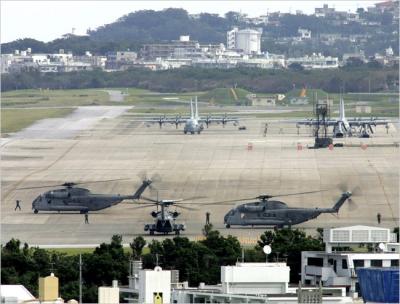Hatoyama, in his limited tenure, stressed shaping an ‘East Asian fraternity,’ improving relations with China, and putting the bilateral relationship with the U.S. on a more ‘equal’ footing. Re-opening the issue of the U.S. air base on Okinawa turned out to be a tactical error. Tragically (and somewhat ironically, since the goal was to build a more balanced relationship with the U.S.) it served to introduce a new element of distrust into the Japan-U.S. alliance that had previously not been present.
Many, in fact, attribute the main cause of Hatoyama’s downfall to his government’s inept handling of the U.S. Okinawa base relocation issue. Under the previous LDP government, the U.S. and Japan, after arduous and lengthy negotiations, arrived at an agreement on how to realign U.S. forces and bases on Okinawa. Then, almost from his first day in office, Hatoyama began renegotiating that agreement, with the aim of moving U.S. bases off of Okinawa. In the end, Hatoyama was forced to reverse his own course and renege on his campaign promise. The attempt to renegotiate an already agreed-upon deal irritated many in the U.S. administration and puzzled Japanese analysts and observers. While the question over the air base location is certainly a hot button issue on Okinawa, Japanese public opinion in general was not especially seized by the question. In fact, in the latter months of the Hatoyama administration, Japanese public opinion became even more supportive of the Japan-U.S. alliance in response to Chinese naval manoeuvres and North Korea’s sinking of a South Korean naval vessel.
Further irritating and confusing foreign relations, during the same period that Hatoyama was zeroing in on the Okinawa base question, Foreign Minister Katsuya Okada began devoting what some considered an inordinate amount of time investigating alleged decades-old secret deals between the U.S. and Japan that supposedly had U.S. nuclear weapons transiting Japanese soil (a violation of Japan’s constitution). While a compelling media event, it compromised Hatoyama’s initial attempts to stake out a more strategic foreign policy framework.
With five new prime ministers in four years, it is not surprising that Japan has been having some difficulty getting its foreign policy act together. Under Prime Minister Kan, with Katsuya Okada retaining his role as foreign minister, no one is expecting any dramatic shifts or major new initiatives in Japanese foreign policy. In fact, one supposes that the Kan government would prefer not to deal with foreign policy-related issues for awhile so that it can address serious domestic economic and social problems that it has pledged to resolve.
Unfortunately for the Kan government, the timing could not be worse. Hatoyama’s final agreement with the U.S. on the base issue is a very broad-brush one, and a great deal of heavy negotiating with the U.S. remains to be done through the summer and fall. The Kan government will have work to do in restoring U.S. confidence, which has been rattled by the Okinawa about-faces.
Japan will host the Asia-Pacific Economic Cooperation (APEC) summit in Yokohama in November, with dozens of ministerial and sub-ministerial meetings being convened in Japan over the next five months. As host, Japan is expected to demonstrate leadership in the quest to liberalise trade and investment in the region. This will be tough at a time when the Japanese economy is experiencing serious fiscal and growth problems.
Meanwhile, South Korea and the U.S. are urging Japan to align more actively with them in pursuing measures in the UN and elsewhere to punish North Korea for sinking the South’s naval vessel. On the Iran nuclear problem, Japan has not spoken out as much as the EU and the U.S. would have liked, further creating some concern in U.S. policy circles.
Whether it wants it or not, Japan has a hat-full of foreign policy problems to deal with and issues to decide on in the next few months. A number of analysts say that the Hatoyama foreign policy initiatives, however poorly managed and clumsily articulated, were the first signs of a new generation of still-inexperienced political leaders trying to carve out a new role for Japan – more equidistant between the U.S. and China and more concerned with non-traditional security issues, such as climate change. Even more fundamentally, these initiatives are being taken as evidence that the Japanese people are seeking a new and different identify for themselves in the world, distinct from the relationship with the U.S. and focused more on global values and concerns.
Other observers conclude that the Hatoyama government was simply too far out in front of Japanese public opinion on foreign affairs questions. This school of thought sees Japan as being quite comfortable with itself as things now stand, not wishing to put itself too far forward on global strategic issues, and fully backing the continuation and even the strengthening of the security alliance with the U.S. This opinion has Japan looking something like an Asian Switzerland or Sweden – wealthy, responsible, decent, a good world citizen whose support and opinions need to be solicited; but not a global decision-maker.
Whichever view may be correct, Japan’s foreign policy agenda in the near term will be complex, challenging, and likely frustrating. As its ally and best friend, the U.S. needs to show patience and earnestly try to understand which of the two images of Japan is emerging as the real one.
Allen Choate is The Asia Foundation’s Vice President, responsible for the Partners in Asian Development initiative, based in Singapore. He can be reached at [email protected].

